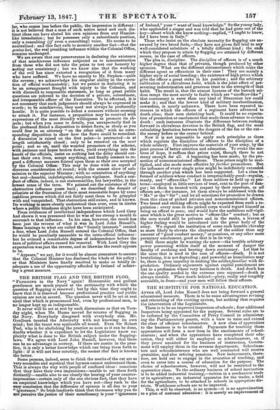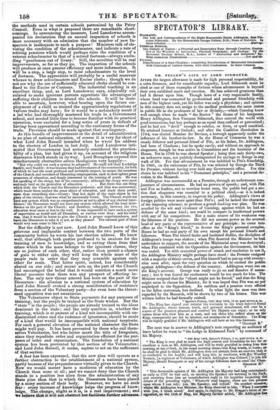THE SUBSTITUTE FOR NATIONAL EDUCATION. AFTER all, Lord John Russell
does not bring forward a general educational measure. There is to be some advantageous revising and retouching of the existing system, but nothing that requires tile intervention of the Legislature.
There is to be an improved inspection of schools ; four additional Inspectors being appointed for the purpose. Several rules are to be enforced by the Committee of Privy Council in administer- ing the Parliamentary grants, with a view to raise and extend the class of efficient schoolmasters. A new class of apprentices to the business is to be created. Payments for teaching those apprentices will form a new item in the emoluments of school- masters ; and when the apprentices have completed their edu- cation, they will either be employed as schoolmasters, or, if they prove unsuited for the business of instruction, Govern- ment will employ them in the revenue departments. Schoolmas- ters and schoolmistresses who are well conducted will receive gratuities, and also retiring pensions. New inducements, there- fore, are held out to engage in the avocation of teaching, and even to enter into a course of education for the purpose. The choice of schoolmasters, however, will not be restricted to the apprentice class. To the ordinary business of school instruction is to be added industrial training,—tuition in a mechanical trade or in agriculture; an industrial apparatus for the trades, a field for the agriculture, to be attached to schools in appropriate dis- tricts. Workhouse schools are to be improved.
This, it will be observed, is no system—it is no approximation to a plan of national education: it is merely an improvement of the methods used in certain schools patronized by the Privy Council. Even in what is proposed there are remarkable short- comings. In announcing the measure, Lord Lansdowne accom- panied his declaration that an annual inspection of schools is most necessary with an admission that the number of new In- spectors is inadequate to such a purpose ! Ministers talk of ele- vating the condition of the schoolmaster, and indicate a rate of retiring pensions which would perhaps raise the condition of a veteran schoolmaster to that of a retired footman—always exclu- ding "gentlemen out of livery." Still, the novelties will be real improvements, so far as they go. The inspection of the schools will produce at once greater efficiency and more information. It will be a step, a large step, to raise schoolmasters to the level of footmen. The apprentices will probably be a useful reservoir whence to draw schoolmasters and Excise clerks ; though we do not see why the use of sufficiently educated clerks should be con- fined to the Excise or Customs. The industrial teaching is an excellent thing, and, as Lord Lansdowne says, admirably cal- culated to make ignorant parents appretiate the advantages of suffering their children to attend the schools. It will be desir- able to ascertain, however, what bearing upon the future em- ployment of a child so trained the apprenticeship regulations of various trades may have for it would be a melancholy result if a lad who had thoroughly mastered his trade in a Government school, and needed little time to become familiar with its practical operation, were excluded for a long series of years in default of having been apprenticed according to the customary forms of the trade. Provision should be made against that contingency. As this bundle of improvements in the detail of administration is no plan of national education, of course it is very far short of what Lord John Russell intended when he wrote• his address .to the electors of London in last July. Lord Lansdowne inti- mated that Government had seriously considered the practica- bility of a plan, but had given it up, on account of the religious dissension which stands in its way. Lord Brougham exposed this mischievously obstructive odium theologieum very happily— "But why could not such a system be adopted ? He could tell their Lordships frankly, very frankly: it was because they had two classes of the community, for both of which he had the most profound and inviolable respect, he meant the members of the Church and members of Dissenting congregations, each in their sphere great promoters of education, and deeply interested in the training of youth. He was not speaking of the clergy, but of the community; although the clergy were most zealously bent on the promotion of education. . . . But there was one thing which both the Church and the Dissenters preferred; and that was controversy, which made them neglect the great object of education, and made them prefer, more than everything else—victory: they lost sight of the main object in the glory of the victory: that was what he universally found. The Church would not have any system which was so comprehensive as not to allow of any clerical inter- ference; the Dissenters would not have any system which allowed the least inter- ference on the part of the Church; and therefore, unhappily, between the two, education went more or less to the wall. It was impossible to have such a system of supervision as would snit all Dissenters, so various were they; and his belief was, that it would be better to give the Church a proper superintendence, and leave the Dissenters to take it or not, as they pleased. The rational part of them would very soon come to like it."
But the difficulty is not new. Lord John Russell knew of this grievous and implacable contest between the two parts of the community before he wrote his last election address. He knew well, that although both parties professed to be anxious for the training of men to knowledge, and so saving them from that crime which in the mass belongs to the ignorant classes, they are so jealous of each other, that, rather than permit a chance of gain to either side, they will keep the whole mass of the people rude in order that they may scramble against each other for souls. That bitter spirit, indeed, has considerably abated on one side; and recent acts on the part of the Church had encouraged the belief that it would sanction a much more liberal measure than there was any prospect of effecting be- fore. The only new threat uttered has been on the part of the Dissenters : the allusion to a national system of education by Lord John Russell evoked a strong manifestation of resistance from a section of the Voluntary party—for even here the threat- ened opposition was not unanimous.
The 'Voluntaries object to State payments for any purposes of training, lest the people be trained as the State wishes. But the "state " is the people ; the people are already trained to the ideas dominant in the state ; and the only question is, whether the training, which is at present of a kind not incompatible with un- diminished crime and the rudeness of ignorance, should be made of a kind that would be incompatible with national turpitude. For such a general elevation of the national character the State might well pay. It has been prevented by those who call them- selves Voluntaries, but who better merit the title of Irregulars, since they repudiate order and organization efficient for the pur- poses of order and organization. The foundation of a national system has been prevented by that section of the Voluntaries ; and Lord John Russell, it seems, aspires to act on the sufferance of that section.
A fear has been expressed, that the new plan will operate as a further obstruction to the establishment of a national system, partly because of the preponderance virtually given to the Church. Now we would sooner have a modicum of education by the Church than none at all ; and we cannot deny that the Church stands in a position less alien from the administration of any State plan than that in which the Dissenters have been placed by a noisy section of their body. Moreover, we have no such fear : every increase of knowledge helps the progress of know- ledge. The change, slight as it is, is a real improvement ; and we believe that it will not obstruct but facilitate further aavances.



























 Previous page
Previous page